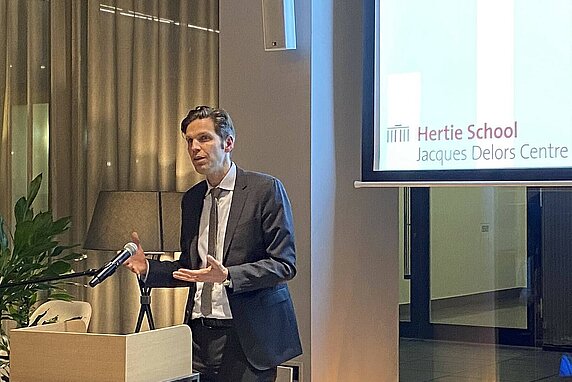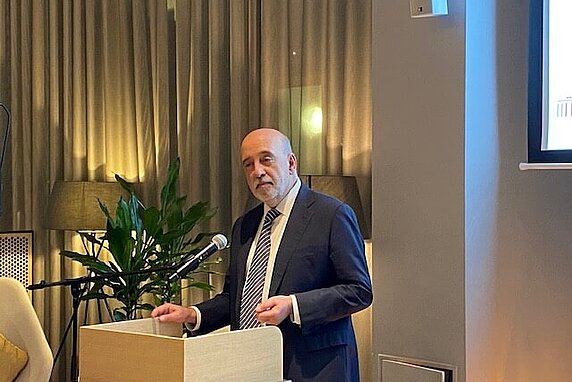High-level speakers discussed the current state of the EU financial system and shared their outlook on the challenges going forward.
On 14 February 2023, the Jacques Delors Centre held a public event on the question of whether Europe has become less financially fragile. The panel discussion moderated by Katharina Gnath (Bertelsmann Foundation) featured Gabriel Makhlouf (Governor of the Central Bank of Ireland), Moritz Schularick (Professor at the University of Bonn), Cornelia Woll (President of the Hertie School) and Carsten Frank (Head of Division Federal Debt at the German Federal Ministry of Finance). Johannes Lindner (Co-Director of the Jacques Delors Centre and Henrik Enderlein Fellow) opened the event with a short welcome address.
Institutional improvements following the crisis
In his opening statement, Governor Gabriel Makhlouf underlined that his reply to the event’s guiding question was a “yes and no”. He acknowledged the actions taken in the aftermath of the Great Financial Crisis 2007-2008 for making the EU financial system more resilient. He pointed in particular to the improvements in the institutional setup ensuring that financial risks are now monitored and supervised at the European level, namely the establishment of the European Systemic Risk Board, the Single Supervisory Mechanism and the Single Resolution Board. Complemented by stricter liquidity and capital requirements for individual banks as well as a macroprudential toolbox for risks that threaten the banking system as a whole, these measures addressed pressing fragilities in the European banking sector.
Together with forceful intervention by the European Central Bank, the current framework allowed the financial system to weather the storm caused by the pandemic and the war in Ukraine. While appreciating these achievements, Makhlouf stressed that there was still more work to do. Without European deposit insurance, the banking union remains incomplete. Not only that, digitalisation and the emergence of crypto pose new challenges for financial institutions and regulators. Last but not least, the growing importance of non-bank financial intermediation bears a systemic risk that calls for the creation of a dedicated macroprudential framework. “The non-bank sector should be a top priority for financial regulators across the world,” said Makhlouf, pointing to the macroprudential measures the Central Bank of Ireland had recently taken.
Unheld promises and endemic fragility
Replying to the event’s question with a resounding “no”, Moritz Schularick argued that financial liberalisation held two promises: first, deeper markets should lead to more stability, and second, more efficient capital allocation means more growth. In retrospective, these promises were not met, according to Schularick. With reference to his recent edited book Leveraged, he stressed that with increasing leverage, the risk to financial stability has become endemic. Turning to the role of central banks, Schularick highlighted that they have to “run ever faster just to stand still” and prevent the financial sector from collapsing. Underlining the failure of governments to address rising inequality, Schularick hinted that capital accumulation at the top would not only endanger social cohesion, it would also fuel financial fragility.
Political fragility as another factor
In the following panel discussion, Cornelia Woll shared her concerns that “with ever more constrained public budgets, political fragility adds to financial fragility”. Woll pointed out that central banks have increasingly become the key actor in a world where governments are unable to agree on reducing leverage or to be more fiscally active. She argued that as a lot of power has moved from democratically legitimised fiscal decision-making to central banks, new issues have arisen for the accountability of central banks, who rely on independence to fulfil their mandate. The relevance of these questions and the evolving role of central banks were echoed both by Schularick and Makhlouf, the latter of whom emphasised the importance of independence for the success of central banks.
Carsten Frank highlighted that the regulatory reforms implemented after the financial crisis, in particular macroprudential analysis and macroprudential policy tools, had significantly improved the stability of the financial system. However, at the same time, both the private and the public sector had increased their leverage in recent years. According to Frank, the failure to further sever the link between banks and sovereign states through the appropriate regulatory treatment of sovereign exposure implied that “contagion risks persist”. Backing this observation, Moritz Schularick underlined that decoupling bank and sovereign risk would be highly conducive to the stability of the Eurozone. In this respect, he said that a European safe asset was desirable.
During the Q&A session, the audience showed a lot of interest in the emergence of crypto-currencies. Governor Makhlouf referred to new EU regulation for stablecoins and, in addition, warned that unbacked crypto-assets posed risks to investors. Professor Schularick, for his part, pointed to the housing market as another potential source of fragility and highlighted that rising interest rates put financial stability at risk.
More about our experts:
-
Cornelia Woll, President and Professor of International Political Economy
-
Johannes Lindner, Co-Director, Jacques Delors Centre





